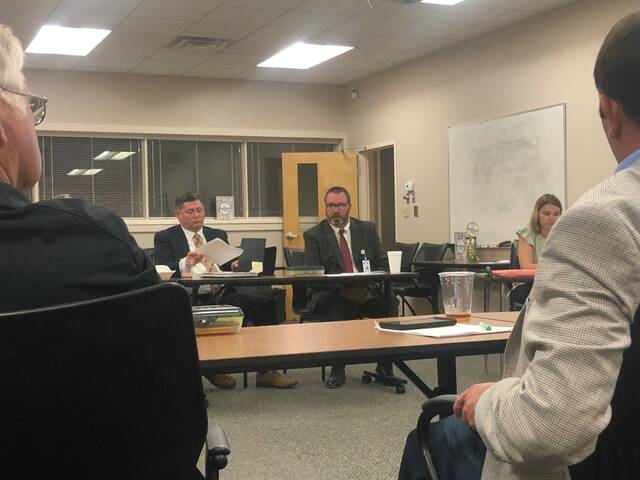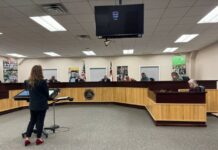
Dr. Joe Ferrell addresses the Board of Education about key short and long term goals for Richmond County Schools.
Matthew Sasser | Daily Journal
HAMLET — Following an already busy slate at their regularly scheduled June board of education meeting, school board members and Dr. Joe Ferrell gathered to share their short and long-term goals of ways to make Richmond County Schools as successful and efficient as possible.
Ferrell, now at about four months at the helm of RCS, provided a summary from his Learning and Listening tour where he visited each school and and their staff in the district. He also had individual meetings with board members, principals, assistant principals, the maintenance and technology departments, law enforcement, ministers, homeschool parents and parent groups and others as well.
All in all, that resulted in over 100 pages of notes that Ferrell gathered and shared Tuesday night.
“I was really happy when I reflected back on it because I feel like they were comfortable to say what was on their mind,” Ferrell said. “I think that matters. Three or four schools did everything in their power to convince me that they were the best school in the district — They were very passionate about that.”
Among the chief positives that were relayed to Ferrell were visible school board members at events, a family-type atmosphere that is cultivated at schools and dedicated teachers who contribute to student success. Each board member identified their long and short term-goals from a prepared list that utilized key takeaways and examples from Ferrell’s tour.
“Long-term — I think the number one for everyone here and I hope the number one thing for everyone here is safety and security,” said board member Scotty Baldwin. “The world is in a bad way and it’s not getting any better. If we’re not doing everything we can to protect the kids while they’re on our campus, we’re failing them.”
Throughout Tuesday’s discussion, school safety and security was the top priority, reflecting Ferrell’s observations and conversations from the past few months.
“Safety and security was the top thing,” Ferrell said. “People would like to see more school resources officers in our and building and practice drills and protocols in place.”
Board members agreed that metal detectors that were recently installed at Richmond Senior are a good first step, but that they should also be placed in all middle schools. Placing a school resource officer in each school was also a priority.
Another recurring theme among the discussion — cameras at RSHS and other areas. Baldwin said they primarily would be used to help keep accountable about who is coming in and out of school property, including during off-hours. Board member Cory Satterfield noted the difficulties he’s had in the past with cameras, and whether there will be an employee constantly watching from those cameras.
“I’m for cameras…I know, one of the biggest headaches I had out there at Richmond Senior when I was principal, the doggone cameras never worked,” Satterfield said. “Then when something happened people would get on me. I had work orders in everyday.”
Assistant Superintendent of Human Resources Dr. Julian Carter said they’ve looked into placing cameras out there, but there is difficulty getting a connection all the way back to the school. The expected cost to solve this issue is “astronomical,” between $25,000 and $50,000, according to Carter.
Board member Daryl Mason noted that in the past, it’s been difficult to even get any information from the cameras when they do work. Ferrell also noted that cameras inside of the school buses are currently operating on an SD card, which when removed to observe footage, can be misplaced or not returned in a timely manner. He said he heard from administrators that a cloud-based system could be more efficient.
Another short-term fix that was highlighted — the intercom at Rockingham Middle does not work at this time.
Related to the school safety discussion was discipline. Baldwin advocated for a more clear, streamlined student discipline process, that would concomitantly help with teacher retention.
“We’re losing kids to Marlboro Academy, to private and charter schools, to homeschooling, because a lot of these kids, mine included…I hear what [they] have to deal with everyday,” Baldwin said. “I think that student discipline and getting the bad eggs out and getting them where they need to be to get on the right track should be a priority.”
Improving academic outcomes
“I can’t tell you how many people said, ‘What are you going to do about the teacher shortage?” Ferrell said. He cited that it’s not a question that can be answered easily or immediately, but he does know that when you create the right culture, good teachers can be retained. “Culture is what – if they feel supported, cared about and treated well, they will stay.”
Retaining not just teachers, but students, was also mentioned. While data on this years dropout rate is not currently available at this time, all board members agreed that it needs to be addressed.
Ferrell said that he was told during his Listening and Learning tour that an Evening Academy of some sort would be an effective way to prevent dropouts and allow student to gain or recover credits.
Satterfield said it was formerly ran by John Searcy at RSHS during his time as principal, but dissolved soon after. Mason chipped in that Wenonia Wall ran a similar program at Ashley Chapel.
“That program works if you have the right person running it.” Satterfield said.
“You got to have a little flexibility for those kids that may not be a day student or working,” said board member Ronald Tillman. “The best option for them may be to go in the evening.”
Ferrell said that during his time as a high school principal, he was able to raise his school’s graduation rate from a low 70s percentile to the 90s, primarily through an evening academy.
“That’s something that takes long range planning and financing,” Ferrell noted.
Aesthetics, communication a priority
“Every school, we need to look at what our first impression is when you walk onto that campus,” board member Jerry Etheridge said.
Board members agreed that there should be a rotational schedule for repainting and refurbishing across the district, and if it looks like care and attention has been placed into their facilities, that it will improve morale.
Something that has flummoxed Ferrell — principals worrying about who will mow the grass at each school.
“When I was a principal I never worried about who was going to mow the grass,” Ferrell said, adding that it came up during each of his meetings with a principal. Some schools have contracted that service out, some custodian or maintenance staff take care of it, and Ferrell said that it should be uniform across all schools.
Additionally, Ferrell said he toured rooms full of surplus items and furniture that aren’t in use and collecting dust at each school that could be utilized more effectively.
Additional notes
• The bus garage in Ellerbe is not air-conditioned. While some of the officers there are air-conditioned, their main garage is not. Carter noted that the building they use is 101 years old.
• Drainage on the baseball field at RSHS remains an issue. “You can’t go from first base to centerfield without it sucking your shoes off,” said Chariman Wiley Mabe.
• When a phone call is placed home is from a school, the Caller ID states that it is from central office not the specific school. “Is there a solution to that probably?” Ferrell asked. “Probably.”
• “We do not have at this time a sufficient replacement cycle plan for devices and we really should have one,” Ferrell said. “That was a big thing.” He also noted that they do not have a replacement cycle for SRO vehicles. Satterfield strongly agreed with the device replacement plan.
• Board members agreed that they would like to continue having permanent substitutes at each school, which was a result of the pandemic.
• “We have too many students on homebound ,” Ferrell said. “We need to wrap our head around that and get that figured out and have as many students in our facilities as possible.”
• Moving Ninth Grade Academy students to RSHS is still planned, but there is not a definitive timeline. “We’re going to start this summer putting a group of people from both schools to plan for that,” Ferrell said. “Whether it happens in a year or two years, if it’s going to happen we need a solid plan in place now.”
• Multiple teachers mentioned to Ferrell that they would like to be able to attend the athletic events hosted at middle schools they may not work at for free. “Middle schools [athletics] do not have the budget that high schools have,” Mason said. “They can barely pay for officials…At Rockingham and Hamlet games, that would cost those schools to lose thousands of dollars a year. When it comes down the middle schools, they can’t afford it.”
• Just about every board member agreed that classified staff should be able to drive the buses when needed.
• A few board members noted that the website for schools and the district could be more navigational, and that the most important information needs to be conveyed at the top.
Final thoughts
After the long discussion, with all of their priorities listed hierarchically, Ferrell said that these concerns will be assigned to RCS central office staff in a restructured organizational chart.
“Ultimately, when we all come back together [for a late June meeting] and do our homework, we can start to think about how what our priorities are and how they tie into our strategic plan, that y’all did a good job on,” Ferrell said.
“I really appreciate your work and your teams work with putting this together,” Tillman said. “I’m excited about the work sessions. It just seems like, to me, we can get more done when we’re sitting like with with the activity that you gave us. I really appreciate it.”
“It does open your eyes and make you think about things differently,” said Vice Chair Bobbie Sue Ormsby. “They take time, but they’re very beneficial.”
Mabe shared the final thought as the clock just ticked past 9:00 p.m., exactly four hours after Etheridge began the official school board meeting with a moment of silence — “We’re all better together.”
To support the Richmond County Daily Journal, subscribe at https://www.yourdailyjournal.com/subscribe or 910-817-3111.
Reach Matthew Sasser at 910-817-2671 or msasser@www.yourdailyjournal.com to suggest a correction.



